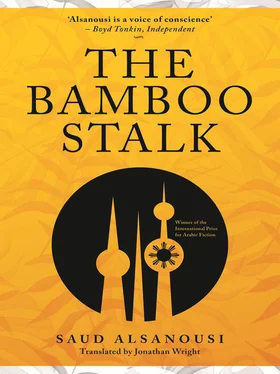‘I’m Isa Rashid al-Tarouf. I’m Isa Rashid al-Tarouf, whether you like it or not. That’s what I inherited from my father. When it comes to my mother, even if I did inherit her appearance I certainly didn’t inherit her old job in this house, where she was Josephine the servant.’ I was furious.
Khawla was standing still at the door watching me. I kicked the tortoise. I pushed the little table, throwing the laptop onto the ground. I grabbed my headdress in one hand and the black ring in the other and shouted, ‘What can I do to make them recognise me?’
Khawla bent down and picked up Inang Choleng, who was upside down on her shell. Grandmother appeared behind her. She had come alone without leaning on anyone’s arm. She leaned against the door frame of my room. Her fear of scandal had relieved her arthritis. Khawla looked back into the inner courtyard, to left and to right, hoping to find out who had helped the old lady up the three steps to the glass door. But then she realised it was fear that had given her the strength to come.
Grandmother was murmuring and crying. She pointed towards the sky with both hands. All I managed to catch was the name Ghassan. ‘What’s she saying? What’s she saying?’ I asked Khawla angrily. Grandmother was venting all her wrath on Ghassan for bringing me back to Kuwait without consulting anyone. ‘All Ghassan did was carry out my father’s wishes!’ I told her. ‘Ghassan did what you should have done.’ Grandmother was tired. She held on to Khawla’s shoulder for support. Her voice was fading but she did keep talking and I caught the names Ghassan and Hind now and then. ‘What’s she saying?’ I asked Khawla angrily again. I was insistent.
She turned away to help Grandmother back inside but she answered me anyway. ‘She says Ghassan brought you back to get revenge on our family because she refused to let him marry Hind,’ she said. With that she went off with Grandmother on her arm and with Inang Choleng in her other hand.
I sat down on my bed, too shocked to think. So Ghassan with the sad face had played a dirty trick — a trick that was out of character with his face. He had waited all these years. He had made all the arrangements for me to come back from the Philippines. He had put me up in his flat. He had treated me kindly, but only to satisfy his own sick desire for revenge.
* * *
Ghassan called me many times that day but I didn’t answer. He must have called Khawla as well to find out why I wasn’t answering his calls. In the evening he sent me a message saying, I found out why you’re not answering my calls . That’s all it said. Ghassan disappeared and I don’t know which of us gave up on the other. His grave offence and the fact that he had been exposed must have persuaded him to avoid confrontation, rather than try to defend himself. Khawla took a neutral position, which left me the task of trying to work out whether Ghassan really had duped me. Khawla said this was what Grandmother thought, whereas Hind dismissed it. As for Khawla, she had no opinion on the subject.
* * *
From the time my father was captured and until years after the liberation of Kuwait, Ghassan was a frequent visitor to Grandmother’s house as a friend of Rashid’s. He asked after them and always reminded them that Rashid’s disappearance did not mean the end of the relationship between him and a house where he felt at home and with people he saw as family. He was in touch with Iman, Khawla’s mother, to ask after Rashid’s daughter. He felt he had to keep the promise he had made to the memory of his late friend. Everyone in the Tarouf household welcomed him because he ‘brought a whiff of Rashid’, as Grandmother put it. But that factor faded with the passage of time. After Awatif and Nouriya got married, Ghassan felt confident there were others looking after the family’s affairs. He gradually grew more distant, but in the meantime a vague relationship had developed between him and Hind. She was the only person who asked after him if he didn’t come, because when he didn’t come she felt the absence of her brother, Rashid, she said. Khawla was young at the time and wouldn’t have known about these things unless her mother had told her. Hind stayed in touch with Ghassan by telephone. Their relationship led to a love affair. Hind kept her feelings a secret from everyone except Iman, who was close to her at the time, until eventually it was no longer possible to continue in the same way. Ghassan proposed to Hind. Grandmother said to him, ‘You’re almost family and we hold you in the highest regard but when it comes to marriage, I pray to God to provide you with a woman who is better than Hind.’ Khawla said she understood why Grandmother turned Ghassan down: she didn’t want her grandchildren to be bidoons like their father — social and legal outcasts.
Ghassan stayed away from Grandmother’s house and went off in his own world, while Hind went through a period of emptiness, which she filled with her interest in human rights. She wrote on behalf of people who had been mistreated, asserting their rights, and took part in public meetings as an activist in the field. Through seminars, television discussions and interviews with newspapers, she became known for defending people regardless of their gender, religion or affiliation. She was famous in Kuwait. People knew her name — Hind al-Tarouf. But what no one know was that the only thing she was defending was a love that wasn’t destined to last long, love for one of those whose cause she had dedicated her life to defend — a cause that became her cause.
I looked at myself caught in all these crosscurrents and waited for recognition from my family. I was horrified. I didn’t want to suffer a fate similar to that of Ghassan. I didn’t want to take revenge on my family even if they didn’t recognise me. I looked around for Inang Choleng. I remembered seeing her upside down on her shell at the door with Khawla bending down to pick her up. I remembered what had happened in my room that same morning: Khawla standing by the door, talking about Umm Jabir and Grandmother’s fears, my rebellion against my weakness and my fears. I’m Isa Rashid al-Tarouf. I’m Isa Rashid al-Tarouf. Do I need them to recognise me, once I’ve recognised myself?
Not after that day, because the time had come for me to set myself free — Kuwait was more than the Tarouf household.
PART 5. Isa. . On The Margins Of The Country
‘It is a useless life that is not consecrated to a great ideal. It is like a stone wasted in the field without becoming part of an edifice.’
José Rizal
1
On the afternoon of the first day of Eid al-Adha, Iman visited the Tarouf house for the first time in ages to wish Grandmother well on the Eid. Her husband mustn’t have known about this forbidden visit. She hadn’t visited Grandmother in Ramadan or at Eid al-Fitr, so what exactly was it that brought her this time? It never rains but it pours, as they say.
Khawla knocked on the door of my room and as usual she didn’t come past the doorway. She told me that Umm Jabir had called Grandmother again and when Grandmother said she couldn’t send me over Umm Jabir asked her, ‘Is the Filipino really called Isa?’ Grandmother almost had a breakdown in response to Umm Jabir’s insinuation. Raju must have been behind this.
I shook my head indifferently and said, ‘So what?’.
Khawla’s eyes were bathed in tears. She told me that her mother, Iman, had had a call from Umm Jabir asking her about the Filipino who was living in the home of her former husband’s family. Iman found out about me without our inquisitive neighbour finding out anything, then came over immediately to ask Grandmother to let her take Khawla to live in her other grandmother’s house, because she didn’t want her daughter living in a house where I was living. I remembered a letter my father sent to my mother in which he said that his new wife would have no problem if I went back to Kuwait. What had changed? Khawla didn’t respond but just wiped away her tears.
Читать дальше












